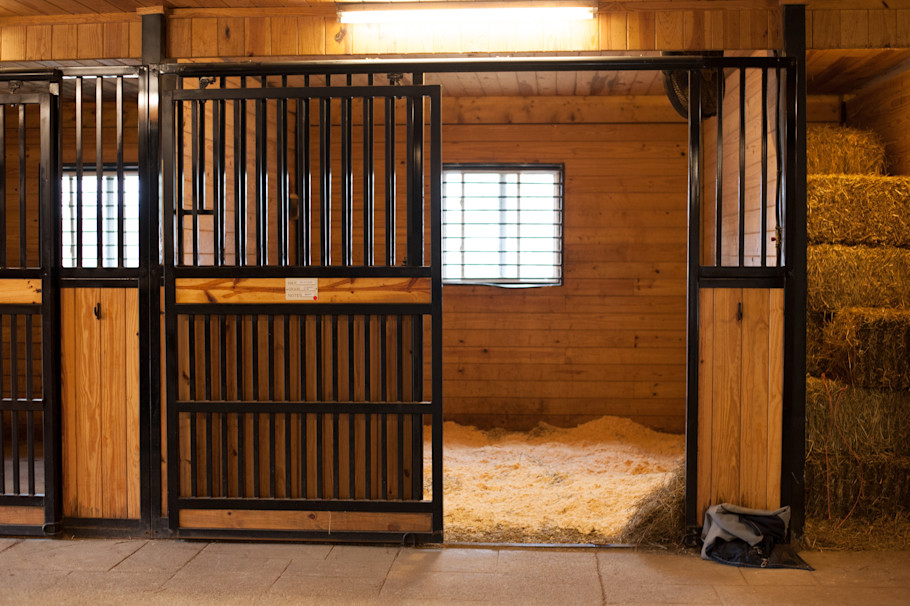Equine Influenza (Horse Flu)
By: Dr. Lydia Gray | Updated March 23, 2025 by SmartPak Equine
Equine Influenza

Equine Influenza (“horse flu”), is a highly contagious infection of the respiratory tract of horses. Caused by a virus, the signs and symptoms of this disease are not specific just to influenza. Therefore, it is important to have a veterinarian examine and diagnose any horse with a fever, nasal discharge, and coughing so that appropriate treatment can be given.
As with other diseases in horses, “prevention is the best medicine,” with vaccination, quarantine, and isolation the best methods to keep equine influenza from spreading to other horses.
Signs and Symptoms of Equine Influenza
Once infected with the influenza virus, it does not take long for a horse to show signs of illness. The incubation period for “horse flu” can be as short as 24 hours, although it typically takes 3 to 5 days for clinical signs to appear.
The signs of equine influenza resemble those of other respiratory diseases in horses such as strangles (Streptococcus equi), EHV (Equine Herpesvirus), and others, and include:
- Fever (up to 106°)
- Nasal discharge (clear and watery at first)
- Cough (dry, hacking)
- Depression and lethargy
- Loss of appetite
- Swollen lymph nodes of the head, neck, and throat
Therefore, it is important to have a veterinarian examine any horse showing these signs so that an accurate diagnosis can be made, appropriate treatment started, and the correct biosecurity protocols followed.
Diagnosing Horse Flu

As with any disease or condition, a diagnosis is made by a veterinarian based on the horse’s history, clinical signs, and whether other causes can be ruled out by testing. In the case of equine influenza, recent technological advances in testing have made it possible to rule in this disease.
Vets have several reliable methods of determining with confidence if the underlying cause of a horse’s respiratory signs are caused by the equine influenza virus. From virus isolation and real-time PCR (polymerase chain reaction) of nasopharyngeal swabs to immunoassays that recognize antigens and antibodies, to traditional blood titers taken two weeks apart, some tests can even be performed “stall-side” or immediately at the farm.
How is Equine Influenza Treated?
There is no specific treatment for “flu” in horses as it is caused by a virus. After isolating sick horses, general supportive care (rest, NSAIDs, palatable food) of sick horses along with good stable hygiene (fresh, clean air and bedding) may be all that is needed unless fever persists, nasal discharge becomes thick and yellow, or the horse becomes more ill.

In these cases, a secondary bacterial infection may have developed requiring the use of antibiotics. Equine influenza that is not complicated by pneumonia, bronchitis, or other issues typically runs its course in 2 to 3 weeks, although more serious cases can take as long as 6 months to fully recover.
Because exercise while the respiratory lining is healing can delay recovery and even lead to long-term breathing and performance problems, the rule of thumb is one week of rest for every day of fever, and no exercise for any horse with a cough.
Prevention of Equine Influenza
There are two components to preventing an outbreak of equine influenza: vaccination and biosecurity.
Vaccination
The primary method of preventing equine influenza is through vaccination. In fact, administering vaccine is so important in controlling the spread of this disease that US Equestrian implemented a “vaccination rule” requiring every horse on the grounds of a licensed competition to have been vaccinated against Equine Influenza Virus and Equine Herpesvirus within six months.
It is especially important for horses to be current on their “flu” vaccine when many horses will be mixed together such as at show grounds, racetracks, trail rides, and other events. Each horse’s own veterinarian is the best resource for developing a custom vaccine protocol that takes into account age, vaccination history, potential exposure, broodmare status, and other factors.
Biosecurity
"Biosecurity” is defined as procedures intended to protect humans and/or animals against disease or harmful biologic agents and includes things like quarantining new arrivals, isolating sick horses, and practicing good hygiene both on and off the farm.

Farms that follow the recommended 2-week quarantine period before introducing any new horses into the resident herd are well within the safety zone when it comes to equine influenza since the incubation period for this disease is so short (1 to 5 days). However, quarantine involves more than just stabling a horse away from the others and taking its temperature twice a day.
Because equipment such as manure forks, muck buckets, hoses, feed carts, and other items can all become contaminated with the “flu” virus, experts recommend dedicating tools, buckets, etc. to the quarantine horse and barn. Human hands are another source of infection, and anyone handling new arrivals should wash with soap and water or use an alcohol-based hand sanitizer before interacting with the existing herd.
Fortunately, the equine influenza virus is easily killed by many disinfectants as long as the manufacturer’s instructions are carefully followed, such as cleaning surfaces of dirt and filth beforehand. This is because organic material such as fecal matter can inactivate disinfectants. Follow label directions closely about handling, amount to be used, whether to rinse, and air drying for safe and effective disinfecting of stalls, aisle floors, trailers, tools, and other equipment.
The saying “an ounce of prevention is worth a pound of cure” is very true when it comes to contagious respiratory infections in horses like equine influenza. By following common-sense measures to prevent horses from becoming exposed to the virus – and vaccinating horses as recommended by a veterinarian – it’s possible to avoid a costly outbreak of sick horses and lost time in the saddle to this common illness.